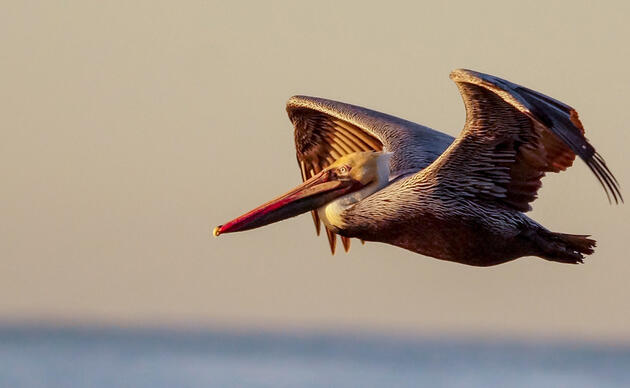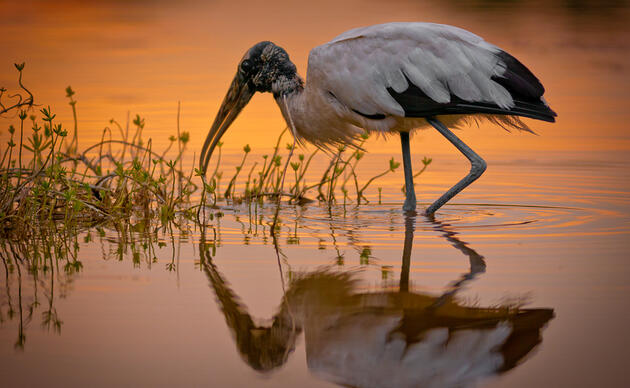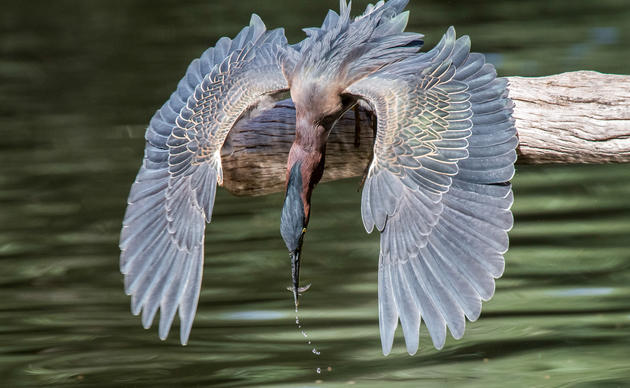CHARLESTON, South Carolina (June 4, 2020) — Introduced in the Senate today, the bipartisan Growing Climate Solutions Act, led by Senators Debbie Stabenow (D-MI), Mike Braun (R-IN), Sheldon Whitehouse (D-RI) and Lindsey Graham (R-SC), will provide technical assistance to the agriculture and forestry industries to help reduce air pollution and atmospheric carbon through natural processes, such as soil carbon storage.
“Working lands have a vital role to play when it comes to strengthening the economy and protecting our natural resources,” said Justin Stokes, Executive Director of Audubon South Carolina. “This bill represents a smart investment in America’s farms, forests, and ranches, which if properly managed, have the potential to pull billions of tons of heat-trapping gasses out of the air each year while preserving critical habitat for South Carolina’s threatened birds, like the Wood Thrush, Hooded Warbler and Brown-headed Nuthatch.”
The bill directs the U.S. Department of Agriculture to establish a set of nationwide protocols and standards that will help farmers, ranchers, and private forest landowners adopt sustainable management practices like planting cover crops, prescribed grazing, and reforestation. In addition to improving soil health and biodiversity on working lands, these types of practices will also serve as natural climate solutions by reducing greenhouse gas pollution from the agriculture and forestry sectors and increasing the amount of carbon these working lands can store in soil and biomass.
“We believe natural climate solutions are key to strengthening rural and urban economies and protecting our natural resources,” said Julia Dietz, Policy Director for Audubon South Carolina. “Not only is Audubon South Carolina supportive of policy efforts like the Growing Climate Solutions Act, but we employ the very strategies the bill is promoting on the 22,000 acres of land we own and manage, so clearly this is an approach we endorse.”
Audubon’s climate report, Survival By Degrees, found that if global temperatures are allowed to rise at current levels, two-thirds of North American bird species will be vulnerable to extinction by 2050. The report also shows different climate threats to specific regions, which also have implications for the people who live there too.
To avoid this fate and achieve net-zero emissions and, Audubon has determined that overall emissions must be reduced while balancing any existing outputs with natural and technological practices that remove carbon from the air.
With these goals in mind, Audubon South Carolina manages the 22,000 acres of land it owns using climate- and bird-friendly practices. It also operates active carbon sequestration and wetland mitigation banks, helping reduce climate and development impacts while funding further forest restoration and management efforts.
Thanks to generous support from the National Fish and Wildlife Foundation, Audubon South Carolina and strategic state, federal, and non-profit partners are also conducting outreach to 15,000 private landowners through the My SC Woods project, which provides education and support for forest and wildlife management, forest certification, cost-share programs, and conservation easements for landowners in South Carolina’s Pee Dee region, with an emphasis on Longleaf Pine restoration and improved management of bottomland hardwood forests.
#
About Audubon South Carolina
Audubon South Carolina protects birds and the places they need, right here in South Carolina. We’re the state office of the National Audubon Society, which has more than one million members and a century-long track record of success. In South Carolina, we represent more than 26,000 Audubon members and supporters, nine Audubon chapters and bird club partners, two Audubon centers and 22,000 acres of land that we own and manage. Learn more about what we do and how to help at sc.audubon.org. Follow us on Facebook at @ScAudubon, Twitter at @AudubonSc, and Instagram at @audubon_sc.
About Audubon
The National Audubon Society protects birds and the places they need, today and tomorrow. Audubon works throughout the Americas using science, advocacy, education, and on-the-ground conservation. State programs, nature centers, chapters, and partners give Audubon an unparalleled wingspan that reaches millions of people each year to inform, inspire, and unite diverse communities in conservation action. A nonprofit conservation organization since 1905, Audubon believes in a world in which people and wildlife thrive. Learn more at www.audubon.org and on Facebook, Twitter and Instagram @audubonsociety.



